
The Slow Professor
Challenging the Culture of Speed in the Academy
La description
If there is one sector that should be cultivating deep thought in itself and others, it is academia. Yet the corporatization of the university demands increased speed and efficiency from faculty regardless of the consequences. The Slow Professor discusses how adopting principles of the Slow movement in academic life can counter this erosion of humanistic education.
Reviews
"What Maggie Berg and Barbara Seeber are doing in The Slow Professor is protesting against the "corporatization of the contemporary university", and reminding us of a kind of "good" selfishness; theirs is a self-help book that recognises the fact that an institution can only ever be as healthy as the sum of its parts. "
- Emma Rees
"The Slow Professor is a notable attempt at recovering humane culture and attentiveness in academic life. Berg and Seeber have begun an important conversation about the philosophical basis of scholarly work; their alternative to the corporate model is a welcome intervention. "
- Joseph D. O'Neil, University of Kentucky
‘A welcome part of a crucial conversation. ’
- Rachel Hadas
“The Slow Professor recognizes the psychological strains of academic work, but subtly points toward explicitly political responses to the emotional toxins we absorb; but, it also avoids the fate of most subject-centred therapeutic exercises which are mainly courses in adaptation and resignation. Although it is no call to arms, no manifesto, nor a shout of defiance at the authorities, for insightful readers, the next step beyond self-awareness will be obvious. ”
- Howard A. Doughty
"'Thrilling' isn't a word I often apply to books about higher education, but these pages galvanized me. "
- Barbara Hunt
"[The Slow Professor] is a manifesto for maximizing meaningful productivity, in place of today’s hurried production of short-lived outputs. "
- June Edmunds, University of Sussex
“It’s a beguiling book, written in controlled anger at the corporatized university, overrun by administrators and marketers. ”
- Rick Salutin
"While The Slow Professor has already raised some eyebrows as an example of "tenured privilege," it’s at once an important addition and possible antidote to the growing literature on the corporatization of the university. "
- Colleen Flaherty
"The fact that precarious labour is becoming the norm in the academy impacts everyone, including those with tenure. "
- Christina Turner
‘Thoughtful, reflective… The best thing this book accomplishes is its unabashed encouragement to talk to our colleagues in order to increase solidarity and togetherness in the combat against changing and challenging professional environments. ’
- Kate Mattocks
"It was after a quarter century of being a professor that I was fortunate enough to stumble upon The Slow Professor: Challenging the Culture of Speed in the Academy by Maggie Berg and Barbara K. Seeber, a book that that expresses much of what I have found wanting in academic life. [It] is an enlightening commentary on the contemporary life of the university professor… [standing] as a dedicated attempt to revive a much-needed vision of the professoriate and the university. "
- Rory J. Conces
"Like slow TV, slow food and slow travel, Berg and Seeber argue that we can practice slow scholarship, by resurrecting the values of deep, reflective thinking, mindful self-awareness and playful creativity. "
- Susie Scott, University of Sussex
"In 90 thrilling pages of text, Berg and Seeber describe the current corporatization of the college campus and urge professors to resist it with all they’ve got. ‘Thrilling’ isn't a word I often apply to books about higher education, but these pages galvanized me … I hope that college teachers will take time to savor The Slow Professor and talk about it with each other at faculty reading groups. "
- Barbara King
‘The book is well researched, nicely written and speaks to an issue of central importance to those of us pursuing the academic life. ’
- Daniel Liechty
"A real value of the book is its insistence that changes in university cultures are not about outlying individuals changing their practices alone but rather about the relationships between individuals and their struggles together to create different cultures through small acts. "
- Kathryn Tellin, University of Sussex
"Ultimately, Berg and Seeber’s book offers a vision of academia is a nurturing, relationally connected company of people seeking a deeper understanding of the world in which they live, a vision that will surely appeal to most. "
- Jamie Barnes, University of Sussex